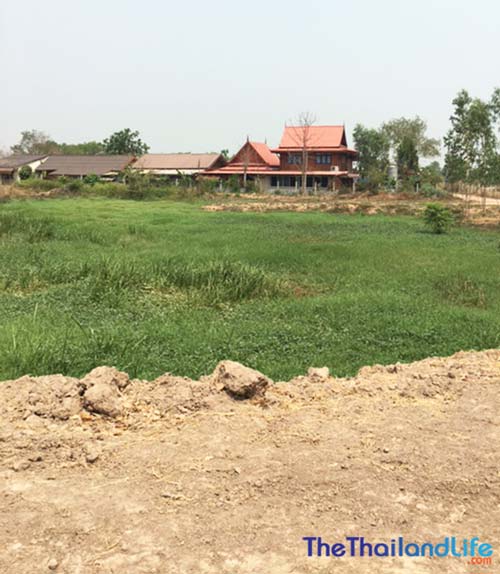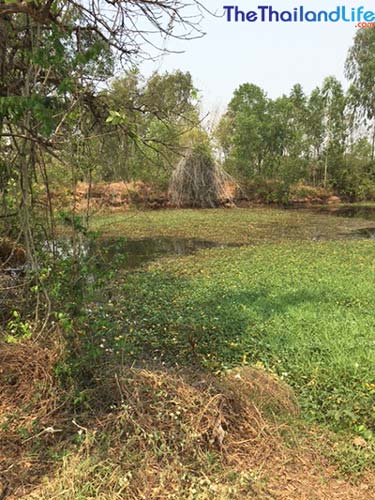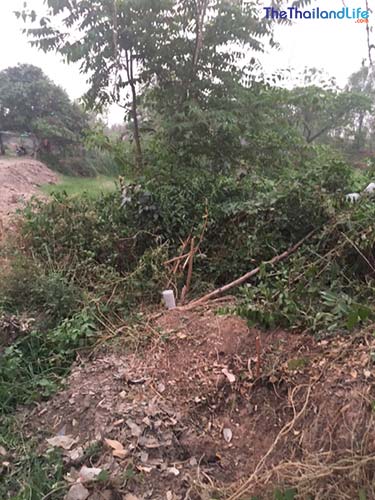Everything You Should Know About Buying Land in Thailand: Plus 12 Essential Questions to Avoid Getting Ripped Off
As a foreigner, whenever you talk about to buy land in Phuket Thailand, some smart Alec pops up and says, “You can’t own land in Thailand, so ner”!
While this is sort of true, the law doesn’t restrict foreigners from owning land in all instances, which we’ll discuss in a moment.
Aside from that, however, I assume that you are reading this post on that basis that your partner is buying land and you want to know the ins and outs so that she/he doesn’t get ripped off or make a mistake. Or, perhaps, as a married couple, you are considering buying land in his/her name to build a house for your retirement.
Whatever the case, it’s important to know what you’re getting yourself into. And believe me, there’s a lot to know. So grab a coffee for this one.

Why Should I Take Advice From You About Buying Land in Thailand?
Good question. Well. I’ve played witness to my wife’s family buying and selling a number of pieces of land, and been the token “farang” at the local government office when my wife has been doing the paperwork on numerous occasions.
Because it’s my duty to provide information on Thailand here on TTL, when I’m in these situations, I make sure I stick my nose in and learn what there is to know. My Thai isn’t too bad either, which means, unfortunately for me, that I understand a lot of the gossip between family and neighbours regarding land disputes, who paid what and why they had to sell. Yawn…
So, Can Foreigners Own Land in Thailand or Not?
Foreigners can’t own land in Thailand. However, a Thai registered company can own the land, and a foreigner can open a company if they meet the requirements.
In addition, a foreigner married to a Thai national CAN own land in Thailand. What?! So all those Thai Visa members are wrong?
Well, yes and no. Check out the legal restrictions to this:
- As the non-Thai spouse, you need to state that you have no rights over the land; effectively waiving your rights to claim the property.
- The property, though purchased by you, cannot be in your name but will have to be in the Thai spouse.
- The married couple may be asked to sign declarations at the Land Department stating that the funds used are the separate property of the Thai spouse.
- Problems may still arise during a divorce case. Proving that the land is marital property will be difficult.
So you can own it, but you have no rights to it when married or in the case of a divorce. It’s a strange piece of legislation, which, by the way, was created so as to avoid discrimination against the non-Thai spouse. It didn’t really achieve its goal.
One option you have is to leasing. Land can be leased to you on a 30-year rolling basis. So, for example, your wife could buy a piece of land and lease it to you for 30-years. You can build a house on this land and live in it, but you’ll never own the land the house is built on and, when the lease is up, you could be evicted.
So unless you buy land through your Thai company, when your partner says, “Let’s buy this piece of land”, it really means “Let’s buy this piece of land for me”.
Now that’s clear, let’s move on.
Understanding Land Deeds & Making Sure the Sale is Above Board
Before you (your partner) rush into buying a piece of land, the first question you must ask is what type deed the land has. In short, anything other than a Chanote should be avoided.
Moreover, find out who has the Chanote and make sure is in the seller’s full ownership and not registered against any loan, usufruct or mortgage, or being held by a loan shark against a gambling debt.
This might sound like scaremongering, but considering the average Thai household debt stands at 248,000, and the prevalence of black market loans and gambling, you’ll find that this is more common than you think.
There are four types of land ownership/possession in Thailand:
– Freehold Title Deed (Chanote Or Nor Sor 4)
This type of title grants the holder of this document full rights over the land, to deal with or to use it to the exclusion of others. Thus, if you’re planning to buy land in Thailand, this type of title deed is the best and most credible title deed to hold.
– Nor Sor 3 Gor
- A land ‘awaiting’ a full title deed is granted the document Nor Sor 3 Kor.
- The land is measured by the Land Department; therefore it has exact boundaries.
- This type of land may be sold, transferred, or mortgaged in the same manner as land with a freehold title deed (Chanote), as long as it is ready to be a full title deed.
- In order to change the title to a Chanote, the owner of the land may file a petition to the Land Department to file a request to change it to a full title deed (Chanote), and the Land Department may do so if there is no opposition made against the petition.
– Nor Sor 3
- The difference between this type of land title deed and the Nor Sor 3 Gor is that land with a Nor Sor 3 title has never been measured by the Land Department; hence the land has no exact boundaries.
- The Nor Sor 3 title may later be switched to a Nor Sor 3 Gor, and can subsequently be transformed to a freehold title deed (Chanote) in the future.
– Possessory Right
This type of title deed is least recommended. A land with a possessory right has never been substantiated by the Land Department and is only recognized by tax payments at the Local Administrative Office.
Reference Source: Siam Legal
How Much Should I (My Partner) Pay Per Rai of Land?
How long is a piece of string? That’s an annoying answer, I know. But land in Thailand sells for whatever someone is prepared to pay for it.
Generally, people start out asking way over the odds. The hope is that someone is really desperate to buy, like a foreigner’s wife who wants him to build a huge house to make all the neighbours jealous.
One key thing to remember is that average Thais generally don’t have access to cash. Most are in debt up to their eyeballs. Even the teachers and government workers who are able to borrow money from the bank to build a big home and buy a nice car would have to negotiate a further loan to buy more land. So in most instances land doesn’t sell immediately, at least not average farmland – which I’ll expand on in a minute.
The price will usually drop by the time the news has reached all the locals and little interest has been generated. And the more desperate a person is to sell, the quicker the price will drop. The land sharks know this.
By land sharks, I mean the few rich, local families who wait for poor folk to gamble and drink away their nest egg and get so desperate that they have to sell the one piece of land supporting their existence.
Buying up rural land has become a common trend amongst the middle classes of Bangkok. Scared by the rumours that much of Bangkok will be under water in 50-75 years, they are sharking for land near the big cities of Isaan; the likes of Korat, Khon Kaen and Udon Thani.
They know this land will sky rocket in price in years to come, with these local economies already thriving and many industries choosing to locate to these areas for cheaper labour and in anticipation of improved transport links.
So, in short, as a foreigner, if you’re present when your partner is negotiating on land, don’t act overly interested, and certainly don’t feel pressured to show your wealth (face) in any way.
Make your enquiry, state what you are prepared to pay and walk away. You can always leave your phone number in case they want to sell at the price you want to pay. Don’t buy in too fast or you’ll pay top whack.

That whole grassy area is like a swap. To fill that in with soil is going to cost a small fortune. Make sure you calculate soil filling (if required) into your finances.
But What About Land That is a Rare Bargain?
In this instance, ignore what I just wrote. What you pay and how quickly depends on the type of land. Some land needs to be bought quickly for the asking price.
For example, a few years ago a perfect square rai of land became available in my wife’s road for 150k. It sold on the day for the asking price. It was a race to see who could get to the bank first and secure the deal.
Perfect land to build a house, already filled in with soil and fenced off, in a well developed road with access to electricity and water, off the main road and opposite a Tesco. The owner needed the cash badly to pay a debt. This land is worth 300k+ now, easily.
In a situation like that, one shouldn’t hesitate. Trying to knock an opportunity like that down to 100k, or even 140k, is a waste of time. The competition for the buy is high and the opportunity is an absolute steal. Don’t wait through stubbornness.
Okay, But You still Haven’t Told Me What I (We) Should Pay
There are so many variables that it makes it complicated to say what one should pay. For instance, beachfront land in Koh Samui is going to be worth a hell of a lot more than farmland in an Isaan village 50km from the nearest Big C.
One key variable you need to understand is the difference between house-building land and rice-farming land. Farmland tends not to have proper road access, a piped water supply or electricity. House-building land should have all these things. Farmland can also be prone to flooding. House-building land should not!
But let’s take that village, far away from the town centre, as an example. Farmland there might go for 10-20k per rai. In a moo baan, near a main road, close to the town centre and shops, etc., farmland might go for 50-70k per rai.
House-building land in the said village might go for between 75-100k per rai. In a well-developed village, with proper roads, near the main road, close to the town centre, close to Big C/Tesco, etc., a rai might go from anywhere between 200k-400k.
If it’s on the main road, you could easily be looking at 1MB. Of course, this all depends on the area of the country, the province and its proximity to an airport and transport links.

Part of a 1-rai piece of land my wife owns. This lake sits at the back of the land but stretches across someone else’s land too. Seems a shame to fill it in, as it has created an ecosystem accessed by many animals.
Transfer Fees, Taxes & Inflated Prices
While no one wants to buy a piece of land over the odds, no one wants others to know that they bought the land cheaply either. This is because it devalues their purchase and potential resale price.
This is why the price of land in Thailand is always grossly distorted by gossip – people spread rumours about how much they have paid, which artificially inflates the local economy and often causes people to pay over the odds.
But rumour matters not when it comes to the land transfer fee. Oh yes, you need to consider this extra little sting in your pocket when buying land. Selling/buying land in Thailand is subject to a transfer fee and, if applicable, a specific business tax. If you are involved in a private buy, you will probably share the 2% transfer tax with the seller.
Now, before you consider declaring a lower price than you bought the land for in order to pay less tax – this little trick won’t work. The land office has a land price index to work from. This index lists the true price of land for each area, and regardless of the amount you declare, you will still pay the required fee on the indexed price.
The transfer fee actually helps you determine how much a piece of land is worth; because you pay the fee relative to the true value of the land. So let’s say you pay 100k for a piece of land which is only worth 50k, you’ll soon find this out when the officer looks up the land value and charges you the appropriate fee.
So in theory, to find out how much a piece of land is really worth before putting in an offer, one could just go to the local government office and ask!
Strangely, no one ever does this. Of course, some officers might be reluctant to give the information to a foreigner, but if your partner goes to the office, or gives them a ring, to ask what the average piece of land is going for in a certain area, they can give an answer. At the very least this gives you an idea of whether the land you are interested in is overpriced, and also a ballpark figure of what you should be paying.
That said, the seller probably won’t care what figure you have in mind. As I said at the beginning of this post, land goes for whatever a buyer is prepared to pay.
You can also find out what a recently purchased piece of land is worth by asking the buyer how much tax they paid, though this a fairly personal question and perhaps overstepping the mark. One thing is for sure, you (your partner) will know what your land is worth when the land officer tells you how much transfer tax you have to pay. At this point you might need a sick bag.
Here’s a breakdown of land transfer fees/taxes in Thailand:
Transfer Fee:
This is the percentage fee of the appraised value of the property being transferred. The transfer fees in Thailand for property is 2% of the property value. The Transfer duty on the property is either shared between the buyer and the seller which is common or it is paid by the buyer.
Business Tax:
The business tax payable over the property is 3.3% of either the sale price of the property or the appraised price of the property. In Western terms it is either the sale price or the municipal value of the property which ever is the higher of the two. Speak to your attorney in Bangkok about who will pay the business tax on the transaction. Note that this tax consists of 3% Business Tax + a Municipal Tax of 10% assessed on the amount of the specific business tax (total tax 3.3%)
Stamp Duty:
The stamp duty in Thailand for the transaction is 0,5% of the sale price of the property. The seller in the transaction normally pays for the Stamp Duty in Thailand. Note that if Specific Business Tax then the Stamp Duty is not payable. It is one or the other which gets paid.
Withholding Tax:
This tax will vary according to who the seller is being either a person or a company. If the seller is a company then the withholding tax is fixed at 1% over the registered sale value or appraised value (whichever is higher). If however the seller is a private person withholding tax is calculated at a progressive rate based on the appraised value of the property.
Reference Source: Bangkok attorney.com

See that small grey post: That is an official measuring post as laid out by the land office. There should be 4 of these marking each corner of the land area. Make sure you can find them. If one or more is missing, you’ll have to book an appointment and wait ages for them to come out and re-measure (can be up to a year).
12 Questions You Must Ask Before Buying Land in Thailand
Okay, I’ve waffled on and there’s a lot to digest, but I hope it’s all of use to you. So in this last section I’ll summarise what I’ve covered in a list of questions you should ask and tick off one by one before you/your partner consider purchasing land:
- Has the land got a Chanote (land deed). Read over the Chanote info section above if you missed it and don’t buy land unless it has a Chanote.
- Is this land “owed” to someone else? People lose land deeds in card games every day in Thailand. Don’t get yourself in to a pickle by buying land that has already been virtually seized in a card game by some mafia-type bloke. This is a sure way to lose your money and attract the wrong company.
- How long has the land been for sale? More than a month? It’s probably overpriced. Negotiate hard.
- How desperate is the owner to sell? Is he/she a gambler or drinker? In debt to a loan shark? Cash is king here. You will land a good deal. I’m not advocating taking advantage of people, but hey, I didn’t create this money system.
- Is the land near a main road?
- Is there access to electricity?
- Is there access to water?
- Is it in a road with other houses or off-the-beaten-track?
- Is it rice-farming land adjacent to other land of the same? If so, consider that even if you convert this to build a house on, other famers might not be too chuffed about it and may oppose your decision and cause you problems. Discuss with the poo-yai-baan first.
- Is the land filled in with soil? So many people make this mistake. If the land needs soil because it’s in a dip and not levelled to the road, the cost of this could equal, and in some cases be double, what you pay for the land. Try to buy land that needs minimal soil filling.
- Are you being played on the price? Like an auction, interest drives up the price. If your partner is being told that so-and-so down the road is going to buy it if you don’t, be proactive and find out whether this is gaming or real interest. Get your partner to ask the said party if they are really interested. The way to handle this is to make out that you are being courteous and don’t want to step on their toes. Essentially, you are saying that you won’t buy it if they had first dibs. In most cases you’ll find the interest was nothing more than hearsay. Once this has been determined, you will find yourself in a much better bargaining position.
- Who is paying the fees? As previously mentioned, transfer tax is usually split between buyer and seller, but some, seeing your “farang face” alongside your partner, might try to off load this onto you/your partner. Always push for the seller to pick up the fees, and never swallow these in your own pocket.
In Summary
Personally, I have no desire to buy and hoard land or houses. Just one house is enough for me. If I did buy some land, I’d probably grow fruit and veg and let locals come and go and take what they need – Buddha knows the kids could do with the nutrition, though I’m sure some greedy so-and-so would spoil the communal vibe by nicking it all in the dead of night.
The fact is, if my wife wants to buy land in Thailand, that’s her business. I’m more than happy to sit in the car park with the air con on typing a new post for TTL while she sweats it out in the land office queue. It always seems like such a long, stressful process. They still do most of the process using pen and paper and huge log books. It’s like an insurance company operation from the 1970s.
My advice is this: If you want to help your partner buy land (financially), consider it a gift, not an investment of any kind. You might get to live on the land, in a house you built, but you can never own it, despite that strange marriage rule that says you can, sort of, but not really.
Go slowly; don’t rush in. Follow the advice set out above and don’t let anyone force your hand. Without wanting to be accused of Thai bashing and generalising, in my experience, the average Thai has a tendency to not think about the finer details of a purchase/business deal. And I think this is where some foreigners come unstuck – in that they expect the obvious questions to be asked and the finer print to be read on their behalf. They let their partner take care of business with their money.
Anyway, I’ll end on this note: I once heard someone say that the key to happiness in Thailand is to rent everything and own nothing. There’s certainly a lot of good to be said for keeping things simple, that’s for sure.
Last Updated on April 3, 2019 by Thailand Life

You are looking for a Property in Phuket – Pool villa, Hotel or Land for Sale.
